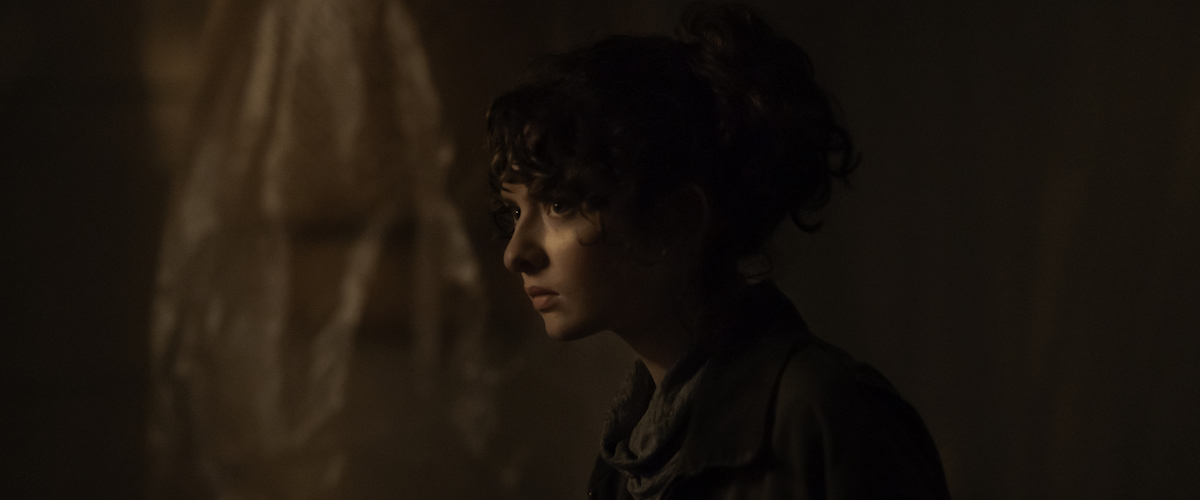In Jeffrey A. Brown’s “The Unheard,” one young woman’s past trauma collides with a present-day terror in a sleepy Northeastern town. After Chloe (Lachlan Watson) enrolls in a clinical trial at the Northeast Eye and Ear Institute (which looks to be based on Mass Eye and Ear) to repair her hearing that was damaged during a childhood illness, she heads out to her dad’s residence on the Cape to recover and help him sell the house where they last saw her mother (Michele Hicks) before she disappeared. You’ll soon discover this town has an awful history of missing women. Lost in between waves of nostalgia and videotape-induced flashbacks, Chloe begins to hear voices and sounds no one else can.
“The Unheard” has its shining moments, but they are not enough to cover for some glaring missteps. Although the premise is strong, its execution is less-than-convincing. Watson plays the leading role in such a whisper that their underwhelming performance doesn’t carry the screams or suspense the movie aims for. It seems as if they weren’t given enough material or direction to liven things up on-screen, which is noticeable since they are alone for a good portion of the movie. Not all of the filming, editing, or writing choices land on the same tone, which lessens the story’s overall impact. Some of the more badly staged moments elicited a few eye rolls and groans from this viewer.
Screenwriters Michael Rasmussen and Shawn Rasmussen weave two parallel scary narratives into one—that of a young woman who undergoes experimental surgery with unintended consequences and that of a haunted town where women like Chloe’s mother go missing. But the two story threads don’t always blend smoothly. Some plot twists are given away or shoehorned in, and some scenes take too much time luxuriating in VCR trips down memory lane instead of building towards something. It’s as if this movie’s rhythm is off-beat.
Despite this supernatural influence from cassette tapes, Brown and cinematographer Owen Levelle imagine Chloe’s world to look rather drab. It’s the off-season on the Cape, but the setting is brown and muddy instead of New England’s famous fall colors. Some images have a soft-focused quality as if the sharpness was blurred to look like it was shot through a light haze. When light streams through the windows, the image looks blown out, intensifying the haze. Other scenes are so aged and vaguely sepia-toned that I briefly thought it looked like a period piece.
Lead actress Watson has the unenviable task of playing a soft-spoken character going through extraordinary circumstances, but their performance never entirely moves past wide-eyed intrigue. The other characters Chloe meets on her journey, like Joshua (Brendan Meyer), the strange boy staying next door, and Hank (Nick Sandow), the odd too-helpful neighbor who seems too suspicious, and Doctor Lynch (Shunori Ramanathan), Chloe’s well-meaning specialist in Boston, are similarly one note.
However, Brown uses sound in such a way that immerses the audience in Chloe’s world. This can mean that conversations sound muted or muffled before the surgery, or it can spike uncomfortably to demonstrate when she’s hearing something beyond what most people can hear. Before and immediately after her procedure, Chloe relies on live transcription software to bridge any sound gaps while the movie’s audio plays unaltered in the background to demonstrate how she navigates the world independently.
It’s a testament to the work of sound designer Colin Alexander and the rest of the sound department that “The Unheard” works at all. Otherwise, Brown’s film left me wanting more. There’s not much else to enjoy from the uninspired visuals, stilted acting, and clunky script that leads up to an ending so fantastically dull it undoes the little goodwill the movie accumulates over the course of its runtime. Perhaps “The Unheard” is better left unseen.
Now playing on Shudder.




















